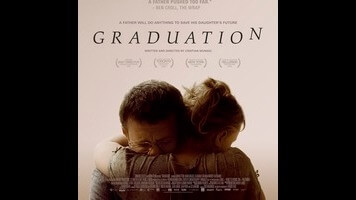One of many remarkable things about the Romanian New Wave, that ongoing cycle of grueling dramas and bone-dry comedies, is the larger picture it paints. The movies talk to each other, putting Romania’s past and present in conversation; to understand, for example, why the frivolous political theater of The Autobiography Of Nicolae Ceausescu is so infuriating, it helps to either be up on the country’s history or to have seen one of the numerous films depicting the hardships that Ceausescu, authoritarian leader of Romania for two decades, inflicted upon his people. Context isn’t necessary, thankfully, to get wrapped up in the knotty moral dilemma of Graduation, the latest slow burn from writer-director Cristian Mungiu, whose Cannes-winning 4 Months, 3 Weeks, And 2 Days brought the movement to international prominence. But knowing the country (or its cinema) does help make sense of the tough choices facing its main character. His ends may not justify his means, but they do explain them.
Model student Eliza (Maria Drăguş) is finishing out her final semester of high school in a crime-afflicted, construction-clogged mountain town of Transylvania. Eliza’s earned a provisional scholarship to study psychology in London—an achievement that fills her physician father, Dr. Romeo Aldea (Adrian Titieni, from Child’s Pose and The Death Of Mr. Lazarescu), with as much relief as pride. But on the day before her standardized exams, on which her acceptance to the university hinges, something horrible happens: Dropped off by her dad in the vicinity of the school, Eliza is assaulted by a sexual predator. Although she’s able to fend him off, the trauma of the incident rattles her deeply, and she bombs one section of the following day’s exam, jeopardizing her bright academic future. Wracked with guilt and panic, Romeo goes into damage-control mode; suddenly this seemingly honest man begins to consider some less than honest solutions to his daughter’s problem.
Graduation, in other words, is all about the fragility of personal principles, and how easy it is for one breach of ethics to snowball into a full-blown crisis, especially when it’s something as strong as parental devotion putting one’s values to the test. The film unfolds with an unsparing plausibility, placing its protagonist on a slippery slope to compromise. Nudged in the right/wrong direction by a shady police inspector (Vlad Ivanov, who played the coldly exploitative abortionist in 4 Months), Romeo greases the system—first, by agreeing to bump an ailing official (Petre Ciubotaru) up the organ transplant waiting list, in implicit exchange for a little leniency in tallying his daughter’s test scores. But that questionable decision has a domino effect, and suddenly several other parties, including Eliza herself, are implicated in the conspiracy. Outside factors complicate the situation further. For one, there’s the longtime affair Romeo has been having with school teacher Sandra (Mălina Manovici). It also comes to light that Eliza is considering not leaving for London at all, mostly because she doesn’t want to split up with her dipshit boyfriend (Rares Andrici). Is there any nobility in this string of backdoor deals if they’re being made to assure someone else’s life plan?
Working in the methodical mode that’s become his signature, Mungiu keeps his camera locked on Romeo, trailing this mild-mannered professional around the rubble-strewn town, like his disembodied conscience. Aside from maybe the similarly celebrated Dardenne brothers, who mines more drama from protracted shots of shoulders and napes? We don’t see the attack (surely the plot’s most sensational element), because Romeo wasn’t there to witness it. And the only music we hear is what comes piping out of a car stereo or wafting off a stage; a non-diegetic score would only interfere with the audience’s moral arithmetic. There’s a strong stylistic integrity to this study of integrity corrupted. What it lacks is the nerve-fraying immediacy of Mungiu’s earlier work. Both 4 Months, 3 Weeks, And 2 Days and the almost equally magnificent Beyond The Hills wrapped their series of unfortunate events in tension worthy of a suspense thriller. Graduation is more calculating, its appeal more strictly intellectual—maybe because it adopts the perspective not of Eliza, weathering a private emotional crucible, but of the parent dispassionately rationalizing every boundary crossed on her behalf.
In the end, it’s the hard questions that linger, disquietingly unanswered. Is Romeo’s stumble into gray areas and beyond forgivable because he’s acting out of paternal protectiveness? Or is he merely projecting his own hopes and dreams, his hatred of their homeland, upon Eliza? Most parents want a better life for their kids, so it’s hard to blame this harried father for doing everything in his power to try to arrange one for his only child. At the same time, getting Eliza involved—tempting her to break her own moral code—may incur a cost much greater than a missed collegiate opportunity. Furthermore, in his desperate attempts to free her from the corrupting influence of the country, the good doctor becomes just another corrupting influence. They say the road to hell is paved in good intentions. But what about the road out of Romania? Graduation makes the case that, for the parents who grew up there, damnation may be a price worth paying to send their offspring somewhere better.









































